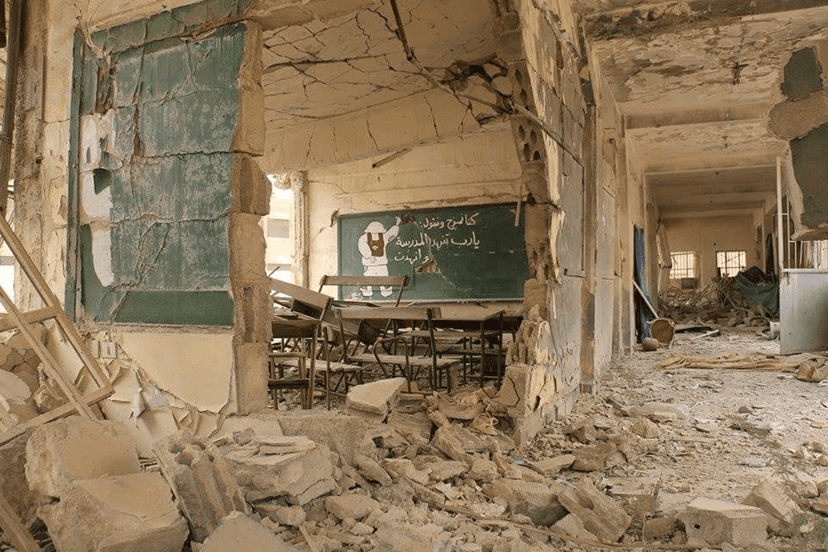In encircled Darayya, student says underground school ‘only activity we can take part in’
In Darayya, the dangers of walking to school include barrel […]
28 July 2016
In Darayya, the dangers of walking to school include barrel bombs, airstrikes and mortar shells. One student in what remains of the Damascus suburb tells Syria Direct how he and his friends get there: “We’ve memorized the roads and the times when they are least likely to be bombed,” 17-year-old Malek Abu Anas tells Syria Direct’s Hussam Eddin.
Syrian army forces surrounded Darayya, located southwest of Damascus and adjacent to the strategic Mezzeh Military Airport, in 2012. Once a city of 170,000, only 8,300 residents remain today.
The combination of encirclement and hundreds of barrel bombs dropped on the suburb brought education “to a complete halt,” Hussein Abu Khaleel, a school principal from Darayya, tells Syria Direct.
By late 2012 all of Darayya’s schools had closed. Today, the abandoned facilities lay in rubble, demolished by barrel bombs and airstrikes.
But in 2014, education returned to Darayya. A group of educated women began teaching children in the basements of an abandoned store. It subsequently grew into an informal school with more than 40 students.
This month, the Iqra wa Irqa [Read and Rise] school held official final exams in Darayya for the first time since 2012.
Interview with Malek Abu Anas, a 17-year-old student in Darayya.
Q: How do you go to school given the siege and airstrikes?
They have become part of our daily life. We’ve memorized the roads and the times when they are least likely to be bombed.
Going to school has become the only activity we can take part in.

Q: What made you decide to go back to school?
When all the schools were closed, there was nothing for us to do. We weren’t allowed to go outside and exercise, or to do anything for that matter.
What is someone my age supposed to do? I saw school as the only way to gain skills. Even if I didn’t receive a recognized diploma, it wouldn’t matter, all I want is to be able to improve my skills and my circumstances as much as possible.
Interview with Hussein Abu Khaleel, director of the Iqra wa Irqa school.
Q: How and when was the Iqra wa Irqa school established?
The idea for the school came from a group of educated women who were volunteering to teach students who had their education cut short.
This led to the establishment of a school in November 2014, but it wasn’t officially recognized by the Syrian National Coalition (SNC) until May of this year. Now the SNC can provide middle- and high-school diplomas. This month official final exams were held in Darayya for the first time since 2012 [the SNC’s Ministry of Education provides diplomas as PDF files].
Q: Where are classes held? Do the locations interfere with teachers’ ability to teach?
We don’t operate out of a single building. Instead, we hold classes in basements around the city. This is the only way to provide a semblance of safety for the students and teachers.
At the same time, to avoid airstrikes, we are forced to hold classes in basements, usually without proper ventilation or lighting.
As a staff, we have attempted to find alternatives to the issue of lighting and ventilation. We use alternatives such as energy-saving LED lights.
We have very few teaching materials since we can’t bring anything from the outside.
Q: Describe the curriculum you use.
For the most part, the curriculum we rely on is what is taught throughout all of Syria. What is different is that we have gone through and altered some the topics which had overt or underlying ideological biases toward the [Assad regime’s ruling] Baath Party.
Other than this, what you find in our textbooks is what you would find in schools in Damascus.
Q: We heard only 10 percent of the students were able to take their final exams. Why was this the case?
We have 40 students in middle and high school.
Unfortunately, the beginning of the testing period came in the midst of an ongoing military campaign against the city. When the regime took western portions of the city, many of the students fled deeper into the city.
Of course with the uptick in military activity, the danger facing the students and the staff only serves to further complicate things.
Q: Given that Darayya is encircled, how did you receive the actual tests in the first place?
The Ministry of Education of the Syrian Interim Government sent questions over Skype. [The Ministry of Education is a branch of the Syrian Interim Government that exercises influence in some opposition-controlled areas in Syria.]







